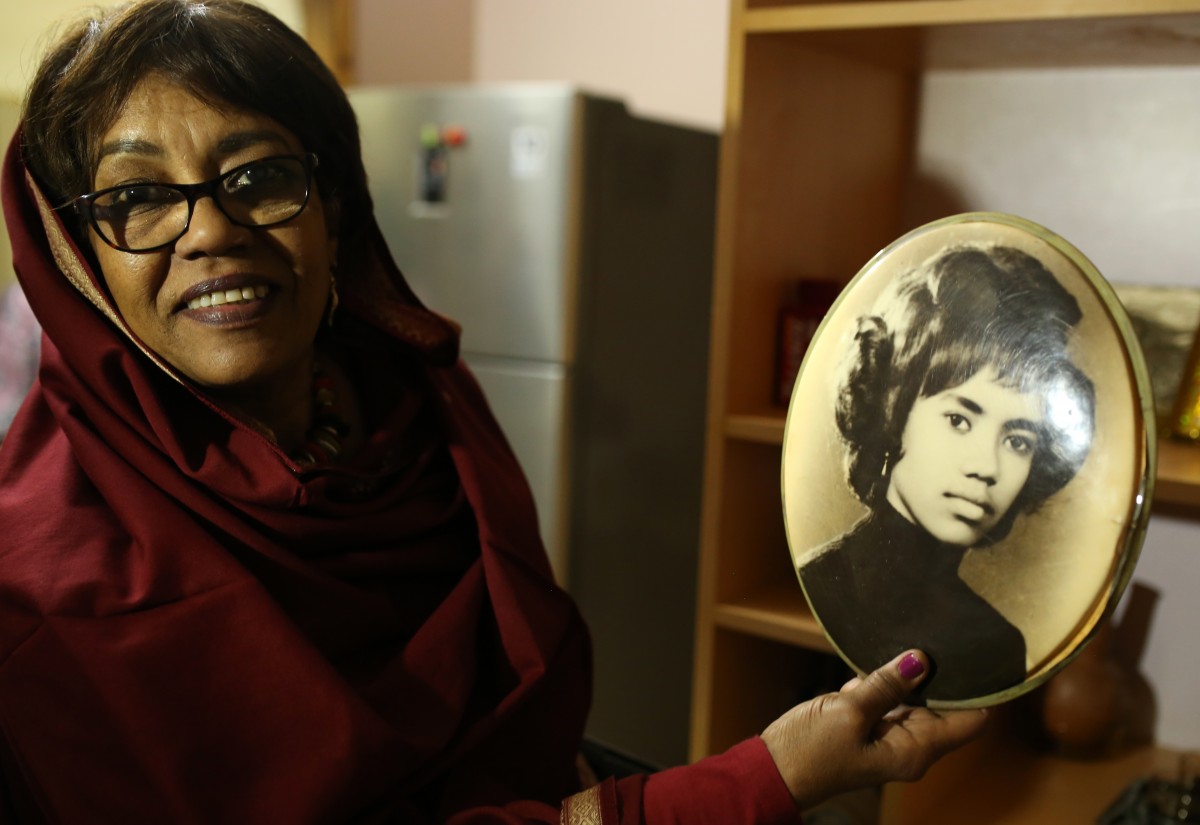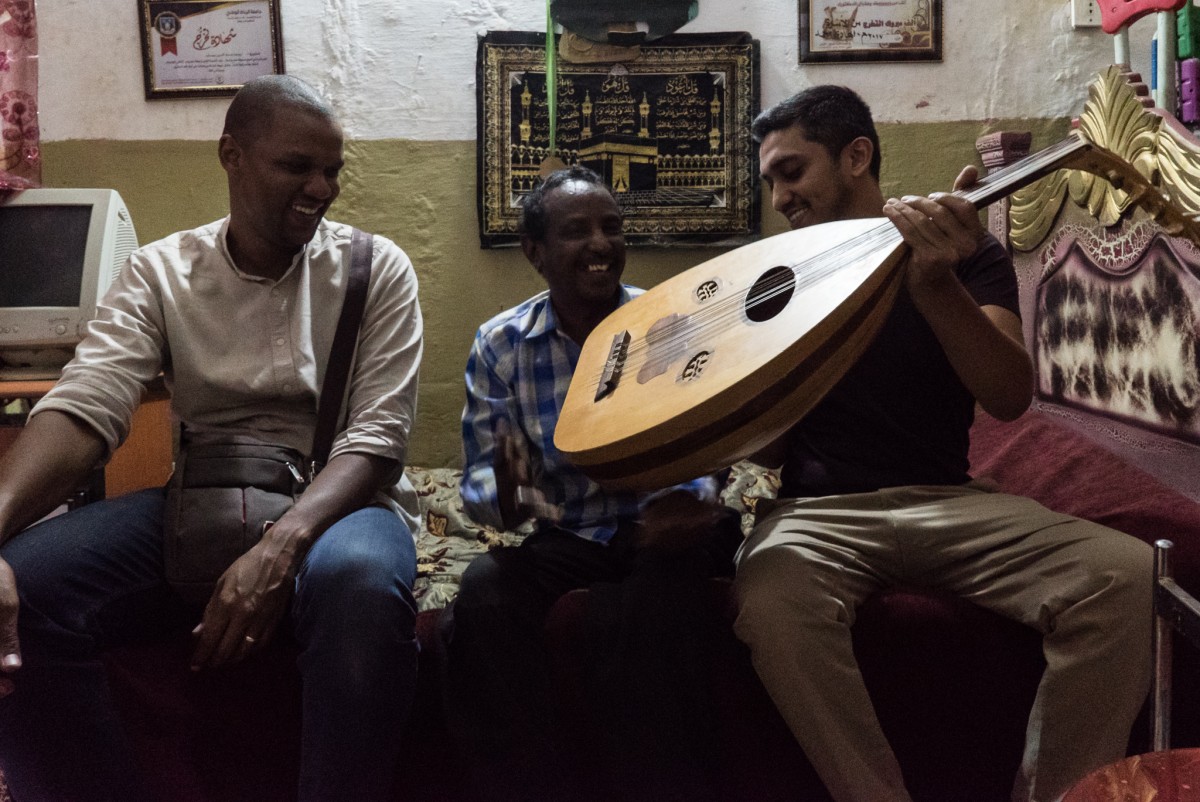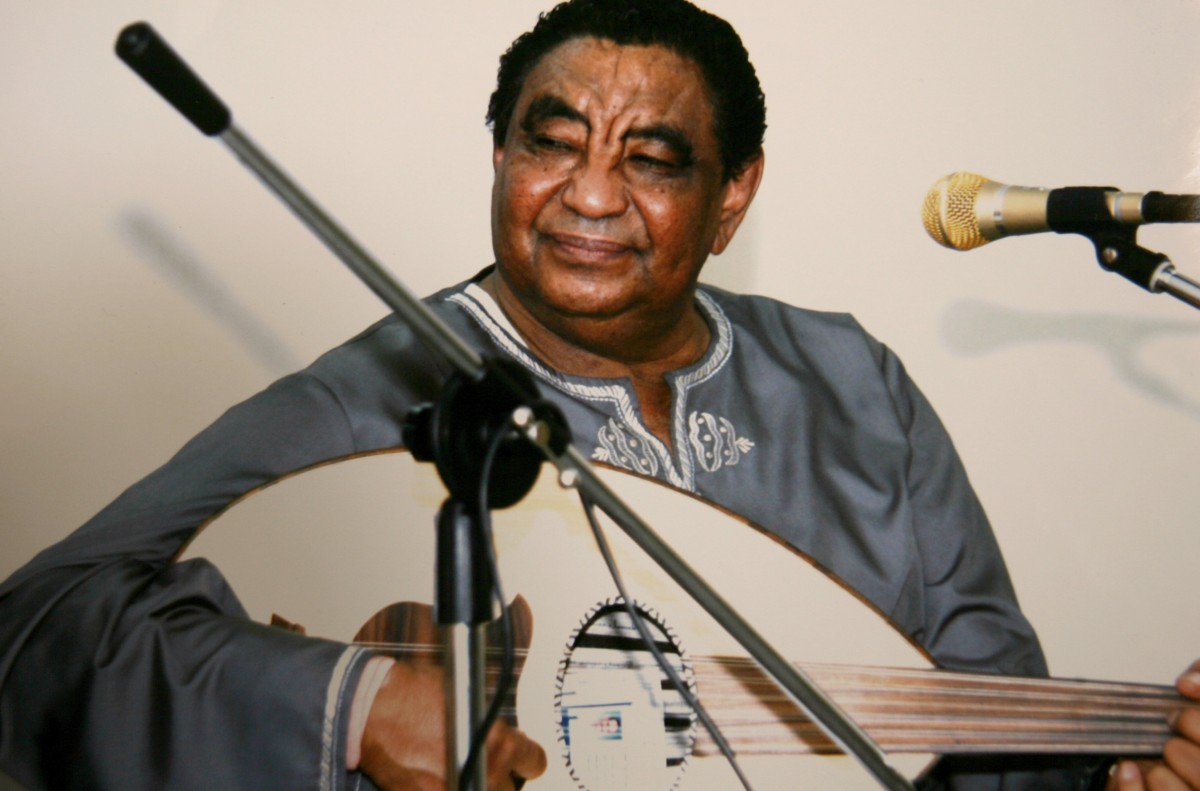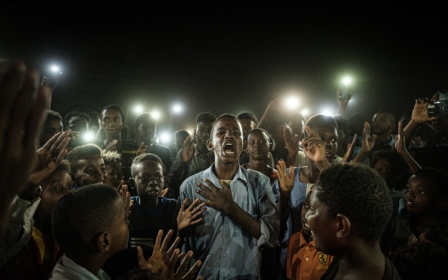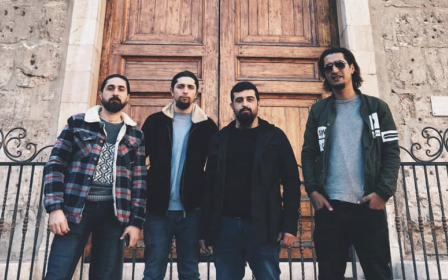Five songs that defined Sudan's golden era
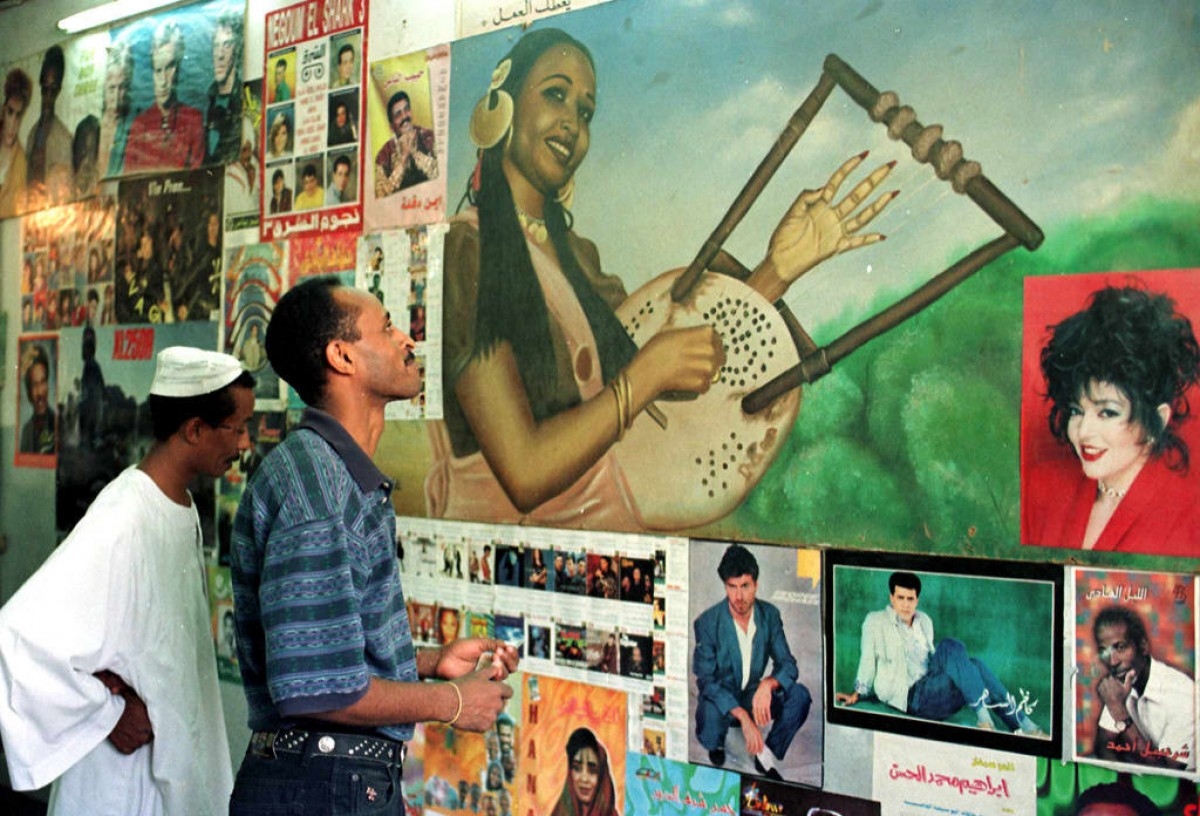
It should be no surprise that music has reemerged in Sudan, an ever-present soundtrack to the cultural and political upheavals defining the African nation to the world.
Halfway through the last century, Sudan's music scene was one of the most vibrant, diverse and influential in the world.
In the sixties and seventies, following Sudan’s independence in 1955, its long-standing tradition merged with the political aspirations of the newly established country, giving way to what is often regarded as its latest and most significant golden era.
“The language that people speak is not Arabic, it is music,” says Vik Sohonie, the founder of Ostinato Records, a record label focusing on music from African countries that have experienced trauma and displacement. In 2018, the label released an album called Two Niles to Sing a Melody, tracing the golden era of Sudanese music.
New MEE newsletter: Jerusalem Dispatch
Sign up to get the latest insights and analysis on Israel-Palestine, alongside Turkey Unpacked and other MEE newsletters
The tunes emanating from Sudan and its most famous musicians were revered across much of the continent. This was particularly the case in what is called the cultural Sudanic belt, a region that spans all the way from Djibouti, at the Horn of Africa, to Mauritania, in the northwest.
The glory did not last long. In 1983, Gaafar Nimeiri, an army colonel who took over Sudan in a coup in 1969 and ruled until 1985, instituted an extreme interpretation of Islamic law, and the country’s music scene suffered its first blow.
'When we talk about African music, we talk about Nigeria, South Africa, maybe Mali and Senegal'
- Vik Sohonie, music producer and founder of record label
Following the seizure of power by the hardline religious leader Omar al-Bashir in 1989, the lyrics from the sixties and seventies started to be purged and clamped down on. Music became a propaganda device, and many musicians were harassed, persecuted or forced to flee. Some were even assassinated.
“Sudan has been completely marginalised culturally from the world’s imagination,” Sohonie says.
“When people think of Sudan they think of conflict, of genocide, and all these things that are part of Sudan’s history but not the only thing… Even when we talk about African music, we talk about Nigeria, South Africa, maybe Mali and Senegal. But Sudan is very marginalised.”
In recent years, and especially following the Sudanese revolution that led to the fall of Bashir in April 2019, some initiatives have flourished in an attempt to redress this historical negligence. One of these is The Sounds of Sudan, a project launched in 2018 that aims to archive and celebrate Sudan's missing and often overlooked musical culture.
“In general, Sudanese music is really poorly documented, and a lot of Sudanese music is not really archived in an organised fashion,” said Hatim Eujayl, the founder of the project. Eujayl adds that archiving music is not only vital as a record of Sudan’s musical heritage but “it allows us to have a better idea of how people in Sudan lived and thought in the past. And it allows us to see what Sudanese people are capable of when it comes to music”.
Eujayl’s archive includes the following five songs, which characterise Sudan’s golden era in some 30 years post-independence.
1. Write to Me Darling, Ibrahim al-Kashif
Dubbed the father of modern singing in Sudan, Ibrahim al-Kashif was born around the beginning of the 20th century in the city of Wad Madani, the capital of Gezira state, in central Sudan. He came on the heels of the Haqiba music, a traditional and mostly vocal style that developed in Sudan in the 1920s and 1930s, and he helped lay the foundations of modern Sudanese music.
In the song Write to Me Darling, one of his most famous, Kashif gives voice to the poem Letters, penned by his fellow countryman Abed Abdel Rahman, according to Sounds of Sudan, who translated the lyrics. The poem is said to be written after the poet and a close friend had drifted apart, which is reflected at the beginning of the song:
My beloved and I were separated after years of companionship.
Distance chose to come between them and me
The composition is filled with charming references to their friendship and the time they spent together:
The nights of the past, oh God bless you
Remember sitting atop hills
Whispering the whispers of youth while we were in the dawn of youth
Lyrics also address both the sorrow of separation (“What’s happening with me, I am lovesick and pining / I wake up at night, groaning and sighing”) and his recipe on how to deal with the distance and the memory:
I’ll write to you, so write to me
The one who remains the love of my life
Remember my affection
Cherish our connection
The song excels in its instrumental accompaniment, which creates a dialogue between the singer and the music. Before Kashif, Eujayl notes, Sudanese music had very minimal instrumentation, and it was he who started to introduce other instruments, like violins, that played an important role in developing the Sudanese orchestra. In this case, the singer integrates the flute, the violin, the oud and the tanbura (a traditional instrument similar to the lute).
Songs like this led to Kashif becoming one of Sudan’s most revered singers in the run up to independence.
2. My Homeland, by Sayed Khalifa
Born in 1928 near Khartoum, Sayed Khalifa is one of the most celebrated singers and composers of the country’s golden age of music. He became one of the first Sudanese singers to follow a systematised musical education - instead of the more traditional method of teaching by listening and repeating - after he had been awarded a scholarship to study at the renowned Arab Music Institute in Cairo in 1947.
Khalifa used both classical Arabic and the Sudanese dialect in his songs. And thanks to the Egyptian media, which mastered in the alignment of cultural power to political power in the time of Gamal Abdel Nasser by promoting artists who supported the regime and its agenda, his powerful voice resounded across the Arab world.
One of his best known works, Oh My Motherland, is also one of Sudan’s most popular patriotic songs, and is part of the compositions he wrote during the Sudanese independence that brought him to fame. Written by Ibrahim Rajab Adaa, the song is a fervent ode to the homeland, and it starts with a romantic idealisation of his youth “on the banks of the Nile” with his lover who “would stay up late with me... just like dreams.”
Khalifa magnifies the nation with his voice (“The land of my loved ones”) with references to its beauty (“How beautiful you are”), his esteem overflowing:
My heart is drowning in love for you
I am so proud of you
I pledge my life to you
He also refers to his devotion to Sudan as having no borders - “I love you whether I am present or absent” - a line that recalls his time abroad.
The presence of the musical ensemble, including both traditional instruments, like violins and percussion, and modern ones like the electric bass and piano, the saxophone and the accordion, is a good example of this typical feature in the Sudanese music of the era.
Despite his patriotic sentiment, Khalifa’s songs were among the ones that were banned once Bashir took power in Sudan, although he managed to evade prison because of his old age and reputation.
3. Child of the Third World, by Mustafa Seed Ahmed
Born in Gezira state, in central Sudan, Mustafa Seed Ahmed is another of Sudan’s most distinguished singers and composers. Like other artists of his time, he was a politically active and committed musician, and used some of his most inspiring songs to address issues related to his country, social justice, equal rights and the struggle of his compatriots fighting military dictatorship.
Ahmed, who died young at 43, left Sudan for Russia in 1989, the same year Bashir took power, for medical treatment, but he never returned to his country. He instead moved to Egypt and finally to Qatar, where he spent his last days and composed a number of songs addressing the sorrow of exile.
According to Sounds of Sudan, the song Child of the Third World, part of a 1992 album, was written by Sudanese poet Layla Maghrabi. It was performed alongside three other artists, and captures Mustafa’s concern on issues of social justice.
The lyrics of the song address the lack of prospects for the children of the third world (“I am the generation of suffering / My day has no tomorrow / And my life is not promised”) as well as their poor living conditions:
Tents of winds are my home
And stones are my furniture
The cycle of my days is one of curses and misery
Sunlight and bread are out of the reach of me and my empty stomach
The song also stresses the need to be committed to the cause: “Take my calls for help, make them the rhythm of your sad songs”, a sentiment echoed in a number of songs from the same period.
4. Those Who Ask Don’t Get Lost, by Al Balabil
Al Balabil (which means “The Nightingales” in Arabic), composing Amal, Hadia and Hayat Talsam, three sisters of Nubian origin from Sudan, are considered one of the most popular bands in the country.
Dubbed the Sudanese Supremes, for them the journey started in Omdurman, Khartoum’s twin city and their hometown, in 1971, when a famous local composer and oud player, Bashir Abbas, asked them and their family to join a folklore group. The great success of the group is usually said to derive from the vibrant voices, the stage performance, the characteristic dresses and the catchy songs - some of them created with some of Sudan’s best composers - that characterise the three sisters.
Even though they largely avoid politics in their lyrics, Amal, Hadia and Hayat quickly became iconic reference points for Sudanese women, given that they managed to rise in popularity despite the traditional society they were born into. Eujayl notes that there were other women singers before Al Balabil, but none of them ever became a sensation the way they did.
Composed by Abbas, Those Who Ask Don’t Get Lost is one of the group’s first songs, its title drawn from an Arabic saying used to encourage people to ask questions. The romantic lyrics capture the story of a lover’s anticipation: “If you cared to ask about me, you’d know where I am today / I’m still waiting for you. Have you forgotten that I invited you over?”
5. Hand Over the Keys of the Country, by Mohammed Wardi
Son of the Nubian town of Wadi Halfa, near the border with Egypt in northern Sudan, the legendary Mohammed Wardi is one of the most influential singers, poets and activists who flourished during the golden era of the country.
In the 1950s, Wardi landed in Khartoum, the city that propelled him to fame after witnessing his first steps as an artist. The Nubian singer also became one of the most iconic musicians abroad. Wardi had massive popularity - Sohonie recalls him once performing at a sold out 60,000-capacity stadium in the Cameroonian capital Yaounde, to a Francophone audience.
Wardi’s career is intimately linked to his political activism as a leftist and as a member of the Communist Party. He was routinely arrested and imprisoned, and his songs were at times censored and marginalised. In 1989, he became one of the first artists forced to go into exile in Cairo following the Islamist military coup, before returning years later.
Hand Over the Keys of the Country was written by another celebrated Sudanese poet, Mohammed al-Makki Ibrahim, and it was performed by Wardi for the first time in 1997 during his exile in Egypt.
The song seems to be directed at Bashir himself, with lyrics critical of the regime: “[Hand over] our abayas and our headscarves / Our Qurans and our rosaries / Our ancestors’ traditions / Our children’s minds / The dreams that we dreamt.”
Hand Over the Keys of the Country was recovered and replayed during the uprising in December 2018 that would oust Bashir
They also reference a “beloved homeland that was left to starve” and “a nation that fed you its milk when you fed it humiliation and starvation". “Where will you escape when both your hands are stained with blood,” the song asks.
Particularly prophetic are the lyrics “the people, huddled together, are standing before you.” The song was recovered and replayed during the uprising in December 2018 that would oust Bashir and prompted Sudanese artist Zoozita to produce a popular modernised cover.
It was during the protests that erupted in Sudan two years ago that many of these hits from the golden era were resurrected, Sohonie says: “I think it’s because they said, ‘Well, there is a chapter we can take from [our] history, we don’t have to always look into the future'.”
“We can say what we had in the sixties and seventies was a beautiful thing, so let’s see if we can, when we remake Sudan and get rid of Bashir, bring some of that culture and life back."
Middle East Eye delivers independent and unrivalled coverage and analysis of the Middle East, North Africa and beyond. To learn more about republishing this content and the associated fees, please fill out this form. More about MEE can be found here.


